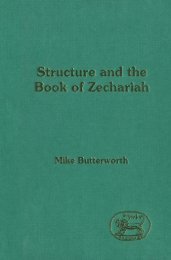Appendix CASE ONE - Collection Point® | The Total Digital Asset ...
Appendix CASE ONE - Collection Point® | The Total Digital Asset ...
Appendix CASE ONE - Collection Point® | The Total Digital Asset ...
You also want an ePaper? Increase the reach of your titles
YUMPU automatically turns print PDFs into web optimized ePapers that Google loves.
James Greenshields and the House of Lords 117<br />
Many cases have been appealed which are not to be found among the decisions of<br />
the Court of Session hitherto published. In sundry instances, also, where Judgments<br />
of the Court of Session have been reversed in parliament, the original decisions<br />
still remain as precedents (and these in some questions of much moment) in the<br />
<strong>Collection</strong>s of Decided Cases, in the Dictionary of Decisions, and in the works of<br />
Law Writers of authority. <strong>The</strong> instances where such reversals are properly stated in<br />
this period [1707-27] are so few as only to form exceptions to the general practice.<br />
<strong>The</strong> same strictures were repeated and broadened by William Tait in the<br />
notes to his index of the cases collected by Morison: 32<br />
<strong>The</strong> protestations of the Scottish parliament for remeid of law, often mentioned in<br />
FountainhalFs journal, are not referred to in the index, no procedure upon these<br />
protestations having been preserved.<br />
Tait added that when the Faculty <strong>Collection</strong> commenced in 1752 the almost<br />
total neglect which the proceedings in appeals experienced from the reporters<br />
of decisions has been succeeded by a regular, although inadequate, degree of<br />
attention to the issue of the appeals of such cases as had been reported in the<br />
collection.<br />
Not only was there a blank in reporting and/or publishing. In the view<br />
of at least one contemporary observer, Greenshields might be ignored by<br />
practitioners. <strong>The</strong> anonymous author of A Seasonable Caution to the General<br />
Assembly in 1711 pointed out the 'sovereign judicature' of the General<br />
Assembly 'in which the queen being always present by her commissioner,<br />
matters are determined without any appeal, except to the Bar of Heaven'. It<br />
was therefore safe for Scottish advocates and magistrates to believe that: 33<br />
<strong>The</strong> peers of Great Britain having considered the commitment of Greenshields and<br />
reverst it does not at all disable and consequently ought not to discourage any<br />
magistrate from acting in their station according to law; it only extends to this<br />
particular case in which, whether some omission, some slip or some illegal step<br />
has been made is not for me to examine here, their lordships not suffering their<br />
proceedings to be printed or examined in print by anybody: but if in another case<br />
which may come before them, such slip or omission or illegal step cannot be found,<br />
such other case will receive no prejudice from this.<br />
In short, this author was sure that Greenshields was no precedent. Those who<br />
disagreed would find their job more difficult without printed reports of the<br />
peers' proceedings. Such publication was discouraged by a Standing Order of<br />
1698: 34<br />
That it is a breach of the priviledge of this House for any person whatsoever to print<br />
or publish in print any thing relating to the proceedings of this House without the<br />
leave of this House.<br />
32<br />
Index to the Decisions of the Court of Session (Edinburgh, 1823), 528.<br />
33<br />
A Seasonable Caution, 5-6, 8.<br />
34<br />
<strong>The</strong> Manuscripts of the House of Lords, N.S., x (1953), 21.






